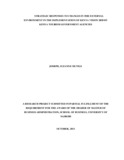| dc.description.abstract | The study set out to establish how the Tourism Government Agencies had responded to
changes in the external environment in the implementation of the Kenya Vision 2030 by
the tourism Government Agencies. In order to address the objective the study made use
of both primary and secondary data. Primary data was collected through a self
administered questionnaire to the five tourism government agencies. Secondary data was
obtained from the agencies in house publications, websites, strategic plans and
newspapers. A descriptive statistic analysis of the data obtained was carried out and
findings were presented in form of a brief discussion on the environmental changes and
key strategic responses identified. The study found that the agencies have managed to
adopt strategies which include new product development, new markets development,
product and market diversification, product and brand differentiation, rebranding and repositioning,
strategic partnering/ co-operative marketing, research and development and
increased destination awareness. The findings further indicated that the following
strategies were not fully utilized which include, Resource Mobilization, Crisis
management, Competency Development, Technological innovation, Quality
management. The study also found that the vision highlights that the Government will
promote aggressive advertising to inform potential tourists about Kenya’s attractions and
facilities in order to increase her global market share. The study concluded that political
and economic are the external environmental factors that are adversely affecting the
tourism industry in Kenya; it is recommended that there is dire need to mitigate the
specific variables that are hindering the growth of the destination. The theoretical
underpinning was based on the Resource-Based View and the Chaos theory. The
research finding revealed that the basis of an organization’s competitive advantage lies
primary in the application of the bundle of its valuable resources. While on the Chaos
theory, the study affirmed that systems no matter how complex they rely on underlying
order and any disruption to that order can make the industry very volatile. | en |

